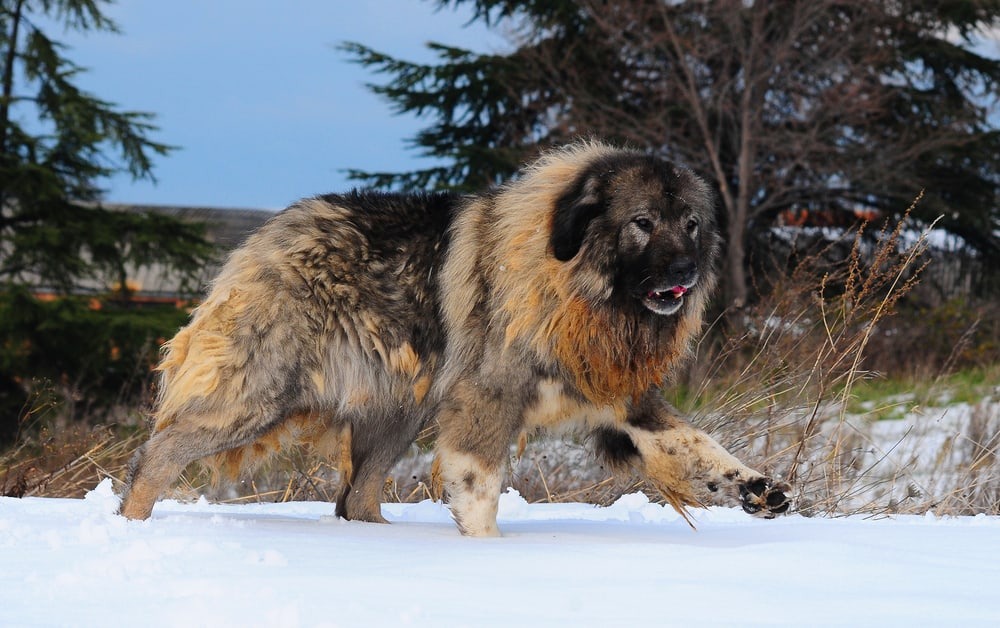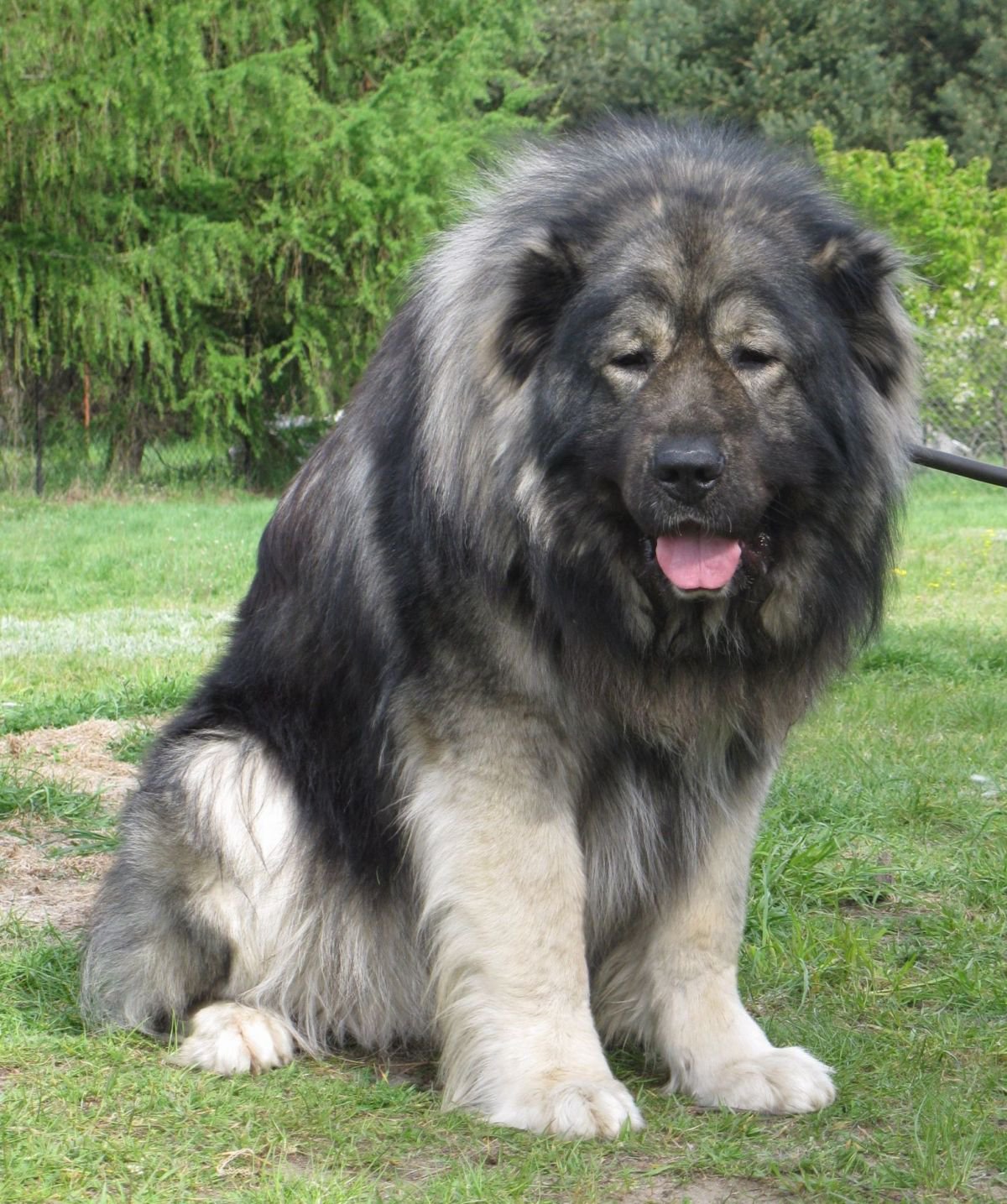Caucasian Shepherd Dog - A Majestic Mountain Companion
When you think of a truly impressive dog, one that carries itself with a certain quiet power and an air of ancient wisdom, the Caucasian Shepherd Dog might just come to mind. These magnificent creatures, often seen as gentle giants, possess a history as vast as the mountains from which they hail. They are, you know, dogs with a very serious job in their past, guardians through and through, and their sheer presence can be quite something to behold.
Originating from the rugged, often harsh, mountainous areas between the Black Sea and the Caspian Sea, a region historically known as the Caucasus, these dogs have spent centuries protecting flocks and homes. It's a place, by the way, where the term "Caucasian" itself has been used to describe people from that general geographical expanse, stretching into parts of Europe and Asia. So, the name of this dog really does give a nod to its deep roots in that particular part of the world, connecting it to a long line of working animals that have adapted to some pretty tough conditions.
For someone considering bringing one of these grand animals into their life, there's a good deal to think about. They are, after all, not just any household pet. Their unique qualities, their need for a particular kind of care, and their strong protective instincts mean that understanding them fully is, well, quite important. We will, in a way, explore what makes these dogs so special and what it truly means to live alongside one of these ancient, furry protectors.
Table of Contents
- What Makes the Caucasian Shepherd Dog So Unique?
- Origins of the Caucasian Shepherd Dog's Strength
- Living with a Caucasian Shepherd Dog - What to Expect?
- Daily Routines for a Caucasian Shepherd Dog
- Is a Caucasian Shepherd Dog Right for Your Home?
- Training Your Caucasian Shepherd Dog
- How to Care for a Caucasian Shepherd Dog's Well-being?
- Health Considerations for the Caucasian Shepherd Dog
What Makes the Caucasian Shepherd Dog So Unique?
The Caucasian Shepherd Dog stands out, you know, for many reasons, but perhaps most strikingly for its physical presence. These dogs are quite large, with a sturdy build and a thick coat that offers protection from harsh weather conditions. Their size alone often makes people pause and take notice, and they carry themselves with a calm, watchful demeanor that speaks volumes about their past work. It's almost as if they are always on duty, observing their surroundings with a quiet intensity.
Beyond their physical attributes, their personality traits are also quite distinct. They tend to be very loyal to their immediate family members, forming deep bonds with those they consider their own. This loyalty, by the way, often comes with a strong protective instinct, which is a core part of their makeup. They were, after all, bred to guard, and that natural inclination remains a significant part of who they are, even in a home setting. They might be a bit reserved with strangers, which is, you know, pretty typical for a guardian breed, as they assess new people or situations with a careful eye.
Origins of the Caucasian Shepherd Dog's Strength
The strength of the Caucasian Shepherd Dog, both in body and spirit, comes directly from its long history as a working animal in the Caucasus Mountains. For centuries, these dogs were relied upon to protect livestock, particularly sheep, from predators like wolves and bears. This demanding role meant that only the most resilient, courageous, and capable dogs could survive and pass on their traits. So, in a way, every characteristic you see in them today has been shaped by generations of facing real-world challenges.
Their thick coats, for instance, are a direct result of needing to withstand frigid winters and biting winds in high altitudes. Their powerful build and their natural caution around anything new are, you know, qualities that made them excellent protectors. They learned to think for themselves, to make decisions about potential threats without constant human direction, which is why they can be quite independent thinkers. This long line of working ancestry means that the Caucasian Shepherd Dog carries a deep-seated instinct for guardianship, a trait that is very much a part of their identity even when they are just lounging in your living room.
Living with a Caucasian Shepherd Dog - What to Expect?
Bringing a Caucasian Shepherd Dog into your home is, well, a pretty big commitment, and it means preparing for a particular kind of daily life. These dogs are not, for example, the sort that will be happy with just a quick stroll around the block. They need space, and they need activities that engage both their bodies and their minds. A home with a large, securely fenced yard is often a much better fit for them than a small apartment, just because of their sheer size and their need to move around a bit.
Their protective nature means that they will likely be very aware of everything happening around your property. This can be a comfort for some people, knowing they have a watchful eye, but it also means managing their interactions with visitors and passersby. They are, you know, not usually the type to greet everyone with wagging tails. Instead, they tend to observe first, deciding if someone is friend or foe, which is a trait that requires careful handling and early socialization to ensure they react appropriately to different situations.
Daily Routines for a Caucasian Shepherd Dog
A good daily routine for a Caucasian Shepherd Dog typically involves a balance of physical activity, mental stimulation, and plenty of quiet time with their human companions. While they are big dogs, they don't necessarily need to run marathons every day; rather, they benefit from consistent, moderate exercise. A long walk, perhaps a good session of playing in a secure area, or some time spent exploring their surroundings can be very beneficial for their physical well-being, and, you know, helps keep them from getting restless.
Beyond the physical, these dogs also appreciate having things to think about. Simple training exercises, puzzle toys, or even just having a job to do, like watching over the house, can help keep their minds sharp. They are, in a way, quite intelligent, and if their minds are not given something to occupy them, they might find their own forms of entertainment, which may not always align with your preferences. So, a predictable schedule that includes both movement and thought can really help a Caucasian Shepherd Dog feel content and settled in their home.
Is a Caucasian Shepherd Dog Right for Your Home?
Deciding if a Caucasian Shepherd Dog is the right fit for your home is, well, a question that deserves a lot of thought. These dogs are certainly not for everyone, and a good match depends on your lifestyle, your experience with dogs, and the kind of environment you can offer. They are, for example, often best suited for people who have had some experience with large, strong-willed breeds before, as their independent nature can be a bit much for a first-time dog owner, or someone who is, you know, just starting out with canine companions.
You also need to consider the time you have available. These dogs thrive on companionship and being part of the family, but they also need consistent guidance and boundaries. They are, in some respects, quite sensitive to their surroundings and the people within them, so a calm, consistent household often works best. If you are someone who is frequently away from home for long periods, or if your living situation is very transient, then a Caucasian Shepherd Dog might not be the most comfortable fit for your particular circumstances, as they do prefer a sense of stability.
Training Your Caucasian Shepherd Dog
Training a Caucasian Shepherd Dog is, to be honest, a process that requires patience, consistency, and a clear understanding of how these dogs think. They are intelligent, yes, but they also have a strong sense of their own opinions, which means that traditional obedience methods might not always work as quickly as they would with other breeds. Positive reinforcement, using rewards and praise, is often the most effective approach, as it builds a good relationship based on trust and mutual respect, which is, you know, pretty important for these big dogs.
Early socialization is also incredibly important for a Caucasian Shepherd Dog. Introducing them to a variety of sights, sounds, people, and other animals from a young age can help them develop into well-adjusted adults who are comfortable in different situations. Without this, they might become overly cautious or even fearful, which can lead to unwanted behaviors. So, starting early and keeping training sessions short, fun, and regular can make a big difference in shaping a well-behaved Caucasian Shepherd Dog, and that, is that, something to really keep in mind.
How to Care for a Caucasian Shepherd Dog's Well-being?
Caring for the overall well-being of a Caucasian Shepherd Dog involves more than just providing food and water; it's about looking after their physical health, their mental state, and their emotional needs. Their thick coats, for example, need regular attention to prevent mats and to keep their skin healthy. Brushing them several times a week, especially during shedding seasons, is pretty much a must, and it also gives you a chance to check their skin for any issues, which is, you know, a good habit to get into.
Beyond grooming, a balanced diet that supports their large size and energy levels is very important. High-quality dog food, appropriate for their age and activity level, will help keep their bones strong and their bodies in good shape. Regular visits to the veterinarian for check-ups and any necessary vaccinations are also a key part of keeping them healthy. It's about providing a good foundation for a long and comfortable life, and that, is that, something every dog deserves, really.
Health Considerations for the Caucasian Shepherd Dog
Like all large breeds, the Caucasian Shepherd Dog can be prone to certain health concerns that potential owners should be aware of. Issues like hip and elbow dysplasia, which affect the joints, are sometimes seen in these dogs. Responsible breeders will usually screen their breeding animals for these conditions to try and reduce the chances of them being passed on, which is, you know, a very good practice. So, when looking for a puppy, asking about the health clearances of the parents can be a very helpful step.
Other considerations might include heart conditions or bloat, a serious stomach issue that can affect deep-chested dogs. Knowing the signs of these conditions and having a good relationship with a veterinarian can help you address any problems quickly if they do arise. Maintaining a healthy weight and providing regular, appropriate exercise can also go a long way in supporting their overall health and helping them to live a long, happy life, and that, is that, something we all want for our animal companions, right?

Caucasian Shepherd Dog – Dog Breed Information and Pictures | Livelife

Caucasian Shepherd Dog - Breed Information and Details

Caucasian Shepherd Dog - All Big Dog Breeds